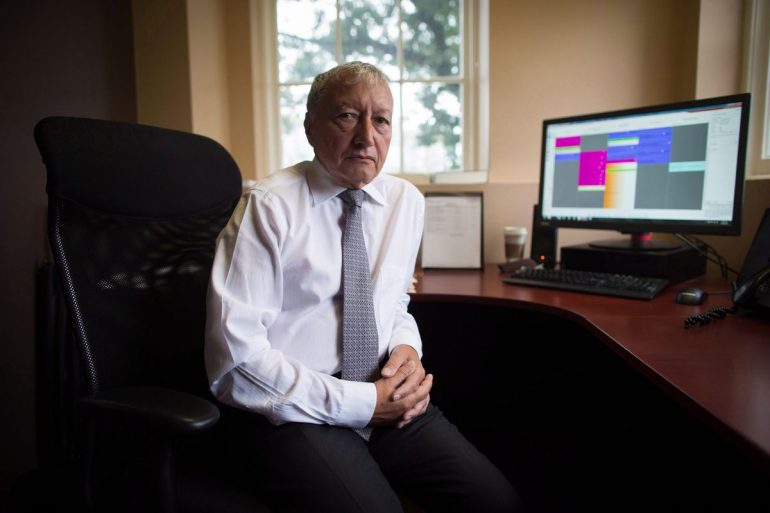Dr. Brian Day, Medical Director of the Cambie Surgery Centre, sits for a photograph at his office in Vancouver on Aug. 31, 2016.
Darryl Dyck/The Canadian Press
A B.C. Supreme Court judge has upheld key provisions in the province’s public medicare system, dismissing a constitutional challenge that critics feared would have opened the door to a two-tiered health care system by allowing access to treatment based on ability to pay instead of medical need.
In an 880-page judgment released Thursday, Justice John Steeves wrote that the provisions of B.C.’s Medicare Protection Act being challenged do not violate the Charter rights of patients who want to pay for private care when waiting times in the public system are too long.
The plaintiffs, led by Brian Day, chief executive of the for-profit Cambie Surgeries Corporation, had sought to overturn provisions that prohibit physicians from accepting pay from both public and private purses, limit extra billing, and ban health insurance for services that are already covered under the public plan.
While the judge acknowledged that, for some patients, excessive waiting times for elective surgery will cause some harm, the objectives of the provisions were neither extreme nor out-of-sync with their legislative purpose.
B.C. health care ruling reminds us that courts cannot improve medicare or fix wait times
The future of medicare shouldn’t be left up to the courts
“I find that the objectives of the impugned provisions, preserving and ensuring the sustainability of the universal public health care system and ensuring access to necessary medical services is based on need and not the ability to pay, are pressing and substantial,” Justice Steeves wrote.
“I also find that there is a rational connection between deterring the emergence of a competitive duplicative private health care system and these objectives. Finally, the evidence also supports the defendant’s claim that the impugned provisions are minimally impairing and their effects are proportionate to their objectives.”
The marathon legal battle, which started in 2009 and entered B.C. Supreme Court in 2016, is expected to continue with an appeal.
The plaintiffs argued that private clinics filled a gap left by the public health care system in which people suffered needlessly while waiting in public queues. Critics countered that the case was not about health care delivery but physician greed, and that opening the door to a two-tiered system would make waiting times even longer in the public system, disproportionately affecting the most vulnerable populations.
Edith MacHattie, co-chair of the BC Health Coalition, one of the intervenors in the case, said Thursday that she cried tears of joy upon reading the decision.
“It’s a completely historic victory against the most serious legal attack our health care system has ever faced,” she said. “The strength of this decision is extremely notable. On all fronts, the plaintiffs have lost this case. Justice Steeves has upheld all components of the health care law in B.C., and was also very clear and strong about the impact of the case across Canada.”
Dr. Day said he was “obviously disappointed” in the judgment, which he says will harm a lot of British Columbians. He plans to seek an appeal in the coming weeks.
“I think the decision gave too much deference to government,” Dr. Day said. “It basically accepted pretty well everything government said and attacked everything that patients and B.C. doctors said. … We produced, as witnesses, many patients and many surgeons. The B.C. government did not call to give evidence, not one single patient, not one single surgeon.”
B.C. Health Minister Adrian Dix said Thursday that he was “extremely pleased” with the judge’s decision.
“I know this will be a disappointing day for Dr. Day and for his supporters, and I want to be respectful of that, but I have to say this is a really important day for public health care, for medicare in Canada and to continue with our commitment to increase the number of surgeries, increase the number of diagnostic tests, to reduce the time people have to wait,” Mr. Dix said.
He acknowledged that private surgical clinics do play a role in health care, with 12,336 people in the public health care system taken off waiting lists through contracts between health authorities and the private health care system last year.
Monika Dutt, a board member of Canadian Doctors for Medicare, said the ruling is a win for public health care in Canada and definitive support for people being able to access public health care based on their need and not their ability to pay.
The medicare group intervened against the case advanced by Dr. Day.
“We saw this as a vital court case both in B.C. and because of the implications across the country,” Dr. Dutt, a public health and family physician based in Sydney, N.S., said in an interview on Thursday. “Reassuringly, the language in the decision was really quite strong.”
The challenge ahead, she said, is to improve the public health care system, protecting the universal, single-payer aspect of the system.
She said the ruling confirms that challenges in health care are not around how it’s financed, but how it’s delivered.
Thierry Bélair, a spokesperson for federal Health Minister Patty Hajdu, said Thursday that Ottawa is pleased to support the government of B.C. in its successful defence of universal, accessible health care.
“All Canadians deserve access to health care when they need it, regardless of their ability or willingness to pay,” he said in a statement. “We firmly believe that patient charges undermine equity – something that is more important than ever as we respond to the COVID-19 pandemic.”
Ann Collins, president of the Canadian Medical Association, said Thursday’s decision was an important moment in the history of Canada’s publicly funded health care system, but that it should also represent an opportunity to reflect on what the future of the system can and should be.
“For too long, funding has not kept pace with efforts to improve how we care for our ageing population, expand equitable access to virtual care, and bolster primary care teams,” Dr. Collins said in a statement. “An increased investment to address these issues would ensure that Canadians have wide-ranging access to the health care they need, when and where they need it.”
With a report from Kristy Kirkup in Ottawa
We have a weekly Western Canada newsletter written by our B.C. and Alberta bureau chiefs, providing a comprehensive package of the news you need to know about the region and its place in the issues facing Canada. Sign up today.

Devoted web advocate. Bacon scholar. Internet lover. Passionate twitteraholic. Unable to type with boxing gloves on. Lifelong beer fanatic.





